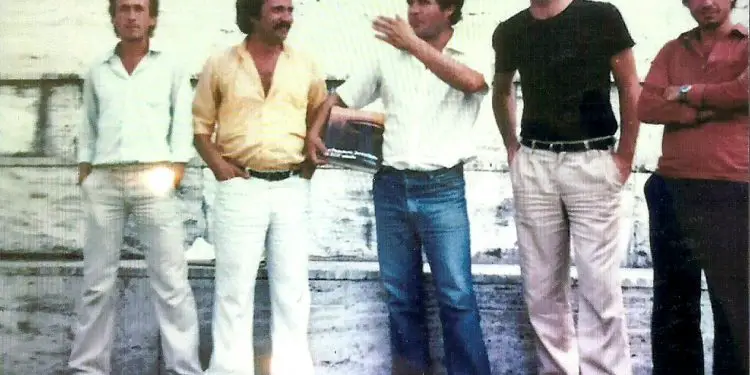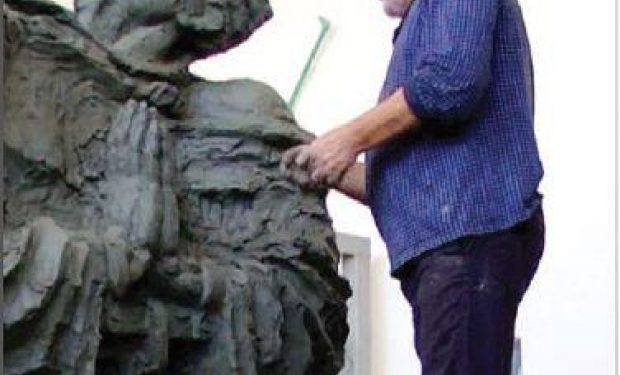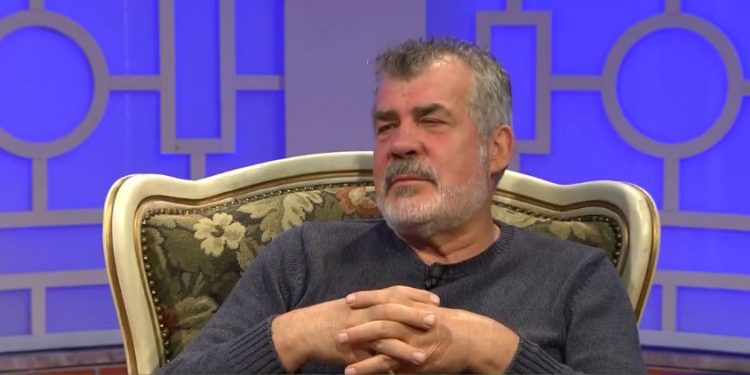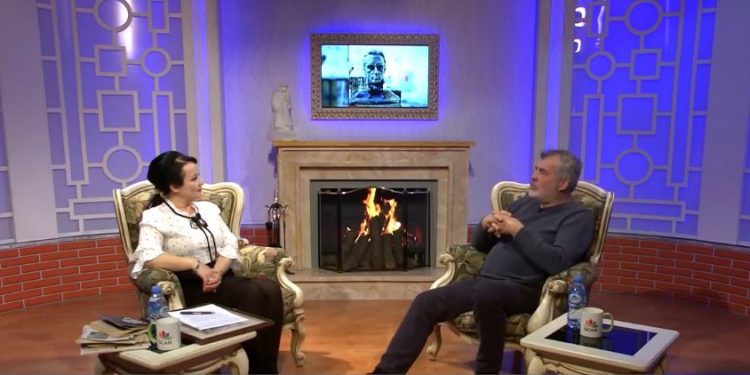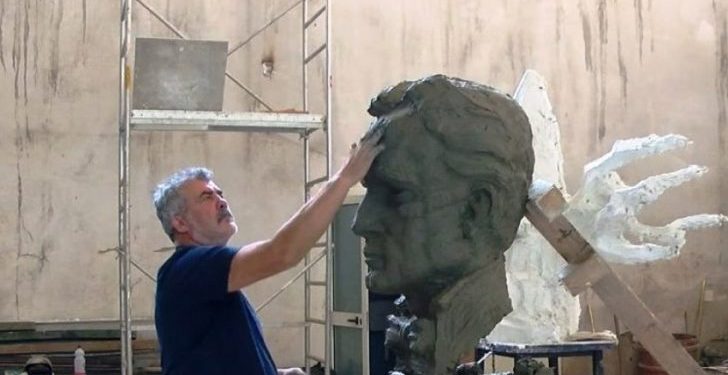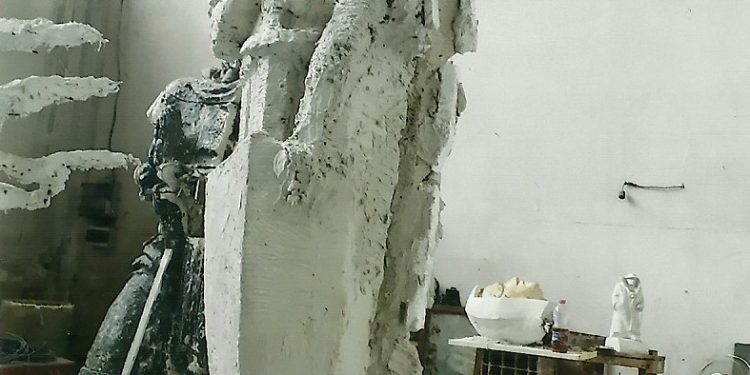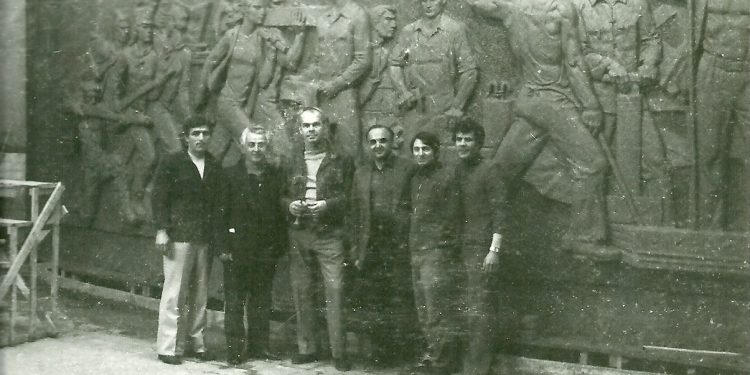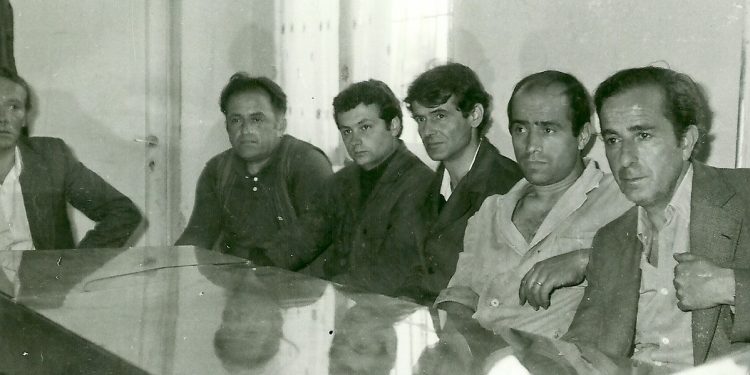Interview I
Memorie.al brings the rare testimony of the famous sculptor, Agim Rada, regarding the early friendship with his friend and colleague, Kristaq Rama, about whom he speaks with sympathy and the opposite about his son, Edin, who once kept him close … “I do not want anything, just let us work quietly”, says the rebellious sculptor about the current prime minister who once had an idol Rada and, in his book, “Reflections”, has written long about him….?!
Agim Rada, who is also the author of the bust of Mit’hat Frashëri that was placed in the hills of Lake Tirana with an official ceremony and that had a harsh reaction from left-wing segments, etc. Mr. Rada has made a short history of his family and personal history, focusing on the relationships and relations he had with his friend and colleague, the sculptor Kritaq Rama, as well as his son, Edin, i who in the 80’s had Rada as an idol and in his book “Refleksione” he wrote at length about her. But this has not flattered Rada at all, who tells about the friendship he had with Edin until 1990, he said that from that time until today, that is, for 30 years that he has not met or did not drink even a coffee with today’s prime minister. For more about this, but also other events and stories from his life, the interview given to Memorie.al informs us.
Mr. Rada, you are an old artist and sculptor with a long career of over 45 years and your works are distributed and located not only in the city of Tirana, but also in other cities throughout Albania. But what made you even more famous, was this work, this bust, of Mit’hat Frashëri, which the director is presenting to us and we are watching it here on the monitor…
Thank you for starting my work with this and it was done very well, as it was a very important event that happened with the arrival in Albania of the remains of the great patriot Mithat Frashëri, and also the placement of his bust on the hills of the lake next to Frashëri brothers.
This is a work of your hands and it has been done in record time say… and such work has been cast in bronze where every detail seems to have been worked with a love…
Yes… in general art has a secret we say or a special specificity, because if you think to create an object, a beautiful work, if there is no love between you and what you will create, it will always come out a fake thing , superficial, a thing that says nothing. I have never done things in my life that I do not like and that I will not want to do. I did not do it even in my youth when he was then forced to do so by political figures, I avoided giving space to my soul and freedom for me to do and create what I want.
We will dwell again on this work of yours, but we are going back a little in time to the story of your life. You were born in Tirana…
Yes, I was born in Tirana in 1953 in an old house, an adobe house that my father made himself after he got out of prison, using pieces of sheet metal, tins, tiles, whatever he could find, with great difficulty to accommodate us we little ones down there under that shelter.
You grew up with a very problematic childhood, as your parents have removed a calvary that we have to show… Here we are looking at this picture where your two parents are, a very handsome gentleman and lady whose nobility is distinguished within them…
This is true, so my difficult childhood, but I am not one of those people who today pick up the flag and say I am persecuted…! But since we were at your question about the parents, I wanted to emphasize that exactly this kind of race, were fought by the villagers coming down from the mountain. I said somewhere that beautiful people, communism hated them. I remember in my childhood and then that the most beautiful girls in Tirana were anathema and rumored to be called prostitutes, just because they were beautiful. Men were also called vagabonds, hooligans, gangsters, etc., etc. And this is why they washed, dressed nicely, perfumed, etc., etc., and this went against the ideology of that system and was considered a crime. But before that, it happened with the national intelligence, with the national clergy, with all the intellectuals who had graduated from schools in the West, who in my opinion have been national consciousness. All of them were imprisoned or ended up in exile. If this did not happen, in case these people would not be imprisoned and their opinion would be heard or of this personality that we are seeing here on the screen, Mithat Frashëri, Albania would not be as it is and as it remained after the War , but it would be a highly developed country.
We go back to your childhood and the hardships of that time because of your father’s imprisonment.
Yes, my father was unjustly imprisoned. He was anti-communist and as such was convicted. Only in Albania did such sentences and imprisonments take place where one of the thousands was my father. After my father was imprisoned, my mother was interned in Berat, then from Berat to Tepelën, and so on, like thousands upon thousands of Albanian families. Since we are at this point, in the internments, in Tepelena, which is making a lot of noise these days, I take the opportunity to stop for a moment. I have heard these historians, so they are told that I cannot call them historians. That history cannot be called a profession, as it is more culture. And we do not need the profession of these two three grains to teach us, distorting our reality. After the time has come that if I want to know about Pyrrhus of Epirus or Julius Caesar, I have every opportunity to find out who they were. But these seem to me not without purpose, they distort history, distort names, etc., etc. I do not know if I am allowed this in this show to mention names…
Yes definitely, we have no problem…
Yes, because I see Paskal Milon, I see a Pëllumb Xhufin, what are some, a Gjeçov is called, who are out of time and without dignity. After stepping on the pain of others and mocking and ridiculing those who were killed and massacred for nothing and calling Tepelena a “holiday camp”, this minimum is not normal. I do not like evil, man, but the parents of those I mentioned above had tried it, they had tried the mud of Myzeqe and the ravines of Tepelena, their children died on the river bank, they had tried it, and then they spoke fl?! Let them not trumpet only the good that that regime has brought us and do not say a word about what I said.
What about your mother, why was she in those camps…?
My mother, the only fault of my mother who experienced those horrible camps, was that her husband was in jail, so. Which was ordered by the neighbors, so that Albania was cleansed of this kind of race by imprisoning and deporting them so that there was no more national consciousness. That power did not want these gentlemen I said above and who had finished schools in the West, that power wanted those who came down from the unwashed, muddy and ignorant mountains. It was beautifully defined by Dritëro Agolli in “The Western Bed”, where that partisan with mud opings lay on the Emperor’s bed and said: “Now I am the Emperor, the power is mine”. And so, power was given to them. My father benefited from a general amnesty and from the ten years he was sentenced, he served four years in political prison and was released.
Have you received prison reparations as the law has long…?
Absolutely not, we got nothing. Look, my mother is still alive at the age of 97 and she is by law the first beneficiary, but we did not get as I said anything. They say no, we need this, we do not need it, not to look at it, etc.
Going back to your childhood, when and how did you get the urge to draw?
This thing happened when I was very young and fortunately, we had the house next to the Stabiliment “Mihal Duri” where the barracks of sculptors and painters were. And I was forced to go there several times a day, and as I watched them paint, I would go home and try to do the same thing, but I was ashamed to tell them what I knew how to do. There were Sali Shijaku, Perikli Çuli, Myrteza Fushekati, Harrilla Dhimo, the deceased who I have a special respect for, because from him my life changed, and many others who loved me and approached me because apparently, they looked at me a child who promised or loved that profession.
Did they approach you; did you enter their studios?
Yes, definitely, they loved me and approached me and got excited when they looked at any of my drawings or when I was doing some little clay sculpture. And I was often told to keep drawing to go to school in Lice. And luck really helped me. I had an excellent teacher, Vangjeli Çomorra, the wife of the famous writer, Spiro Çomorra. Zysh Vangjelia was 8 years old, and I had a first-grade teacher, Gjinovefa Qirjako, excellent, I dedicate it to her who marked my life and profession. (She was the wife of Sotir Qirjako, a great physicist teacher and chess player).
So, she was the first to notice in you the talent to draw…?
Yes, Zysh Gjonovefa, after seeing that I had a certain talent for drawing, told us in front of the class: “Gimi will not tell us the lesson of oral singing in front of the class, but he will show us with drawings”. And I used to draw with the colored pencils that the same office gave me, and she would enjoy it and take me out in front of the class, praising me. And I had great fun.
How did you go to school, when your biography was known…?!
Look, we were lucky that in our neighborhood we had all the vandals and no income. All the families got along very well with each other. Even the Front chairman we had a very good man, a gentleman. His name was Vladimir Shanto, he was the brother of Vasil Shanto. And from him I have the school. His father said, “How are we going to do it for Jim?” “Do not worry,” he told his father, “we will fix it.” And really, I went and competed in Lice and I did very well. But when I started school, I lost two brothers at once, soldiers. Think, they were labor then and, in these conditions, I was forced to go back to school at night and work during the day to help my family and myself. I have done various jobs from the hardest, slave work…
And you were only 14-15 years old…?
I am only 14-15 years old and I have done work that all those who know me, that is, that I have had through various jobs, know that I am telling the truth. I worked in Woodworking, I loaded boards, I collected sawdust, we had it close by. Then I went to the Brick factory in Treshi, in Kamza, where I pushed brick wagons. A very hard job, I was kiddy and my boots were above my knee. They were rubber boots and filled with water and mud and rotted the foot, so it was better to sit barefoot than with your feet in water boots. I also had an old military coat that my father had behind me and I wore it and fastened it well. When I went it was good that there was a bus, but when I came there was not and I had to go back on foot to the house and the road from where the dogs came in front of me, I always carried a tree with me so that I would not be afraid of being eaten./Memorie.al
Continued




